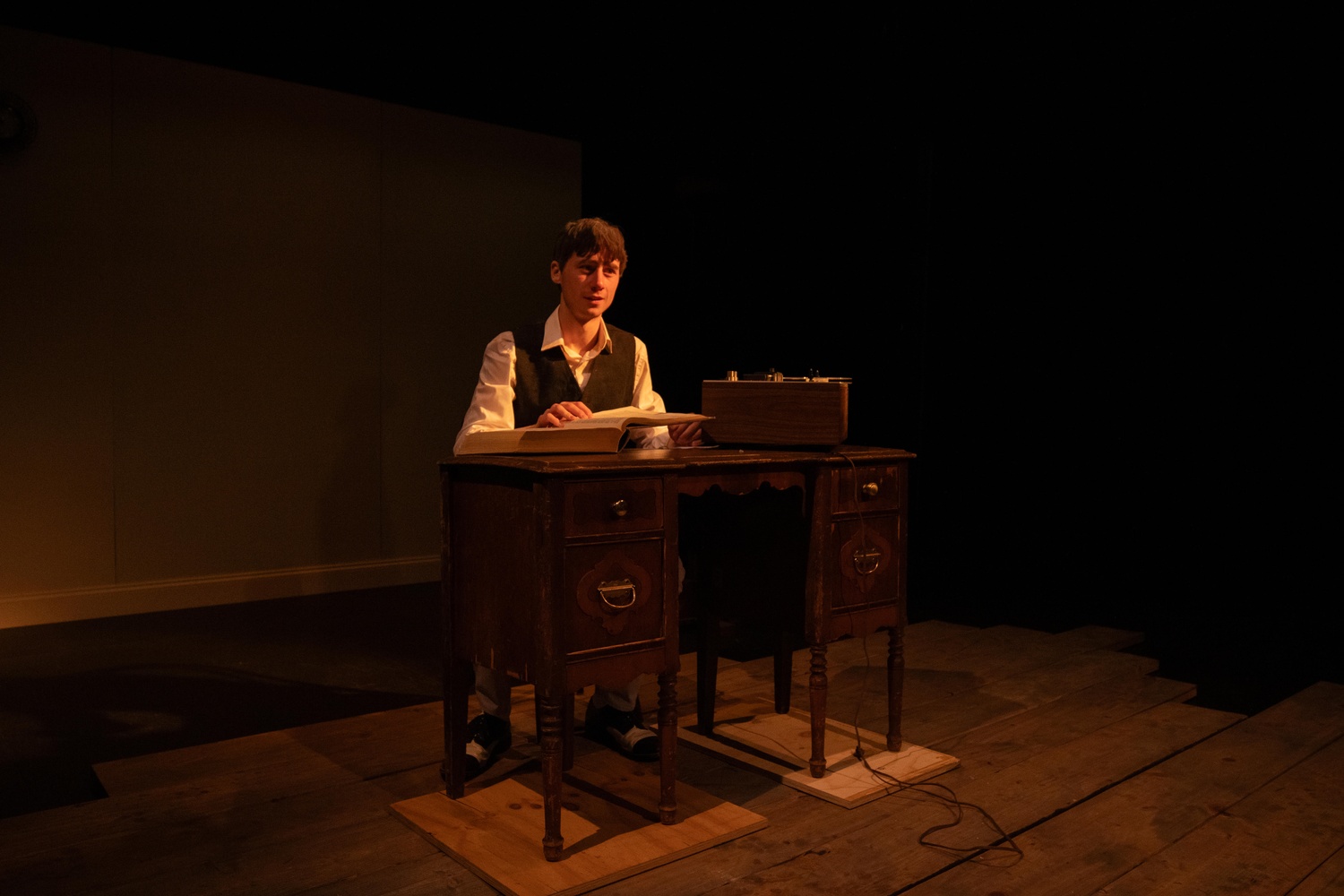
News
Summers Will Not Finish Semester of Teaching as Harvard Investigates Epstein Ties

News
Harvard College Students Report Favoring Divestment from Israel in HUA Survey

News
‘He Should Resign’: Harvard Undergrads Take Hard Line Against Summers Over Epstein Scandal

News
Harvard To Launch New Investigation Into Epstein’s Ties to Summers, Other University Affiliates

News
Harvard Students To Vote on Divestment From Israel in Inaugural HUA Election Survey
‘Krapp’s Last Tape’ Review: Meaningful Stillness

“Krapp’s Last Tape” — directed by Gunnar C. Sizemore ’27 — asks its audience to reflect on which moments in life really matter through an exploration of what it means to grow older.
“Krapp’s Last Tape,” Samuel Beckett’s 1958 one-man play, is a dramatic, poignant piece following the 69-year-old Krapp (Jack T. Flynn ’26) as he reacts to a series of tapes that he recorded on his 39th birthday. The tapes highlight the loneliness, sadness, and regret that have characterized Krapp’s life as he both scoffs at and longs for his younger self. The play paints a dark picture of the passage of time for Krapp, who, at 38, failed to recognize the value of love and has been left alone with his arrogance as a result. “Krapp’s Last Tape” is an intense, dramatic, and meaningfully still production that uses lighting, blocking, and exceptional acting to explore the decisions that define our lives.
The production embraces a slow start, not by accident, but to facilitate a peek into the life that Krapp lives. Scenic designer Priya Allen ’27 depicts Krapp’s home as both plain and cluttered, with relatively little color or action and scattered brown boxes cramping the desk space. For the first few minutes, Krapp seems almost a fixture of the set. He sits, lost in thought, looking as soulless as his surroundings. The decision to show the dramatic stillness of Krapp’s life by fitting him in perfectly with his surroundings brings out the nuances of Krapp’s background, including the loneliness that characterizes his life, as a result of his past mistakes.
“Krapp’s Last Tape” does a phenomenal job of painting a vivid picture of the titular character’s life and priorities using little action. Flynn excels at conveying Krapp’s thinking through only his facial expressions. As Krapp listens to his younger self describe the beautiful eyes of the woman he once loved and lost, his face says it all — encompassing awe, sadness, love, and regret.
These expressions are complemented by well-designed lighting by Alice S. Guo ’27. The lighting perfectly reflects the tone of the story with brighter lighting during moments of action, where the focus is on the tapes or Krapp’s movement, and darker lighting during moments of transfixation to reflect Krapp’s inner loneliness. One standout moment of the play comes near the end, as darkening lighting casts shadows on Krapp’s face, rendering him almost ghostly. The shadows combined with Flynn’s perfect, soulless expression strike a powerful chord as Krapp’s regret fills the space.
One may wonder if this play is too slow to be entertaining. After all, the first ten minutes are focused simply on Krapp eating a banana … and then another one. But in a piece like “Krapp’s Last Tape,” stillness is important for character development. The decision to embrace this stillness, instead of intuitively filling it with unnecessary action, gives one the time to interpret Krapp’s thoughts in their own way. The production’s blocking enhances the motif of time — a clock in the corner and the rewinding tape serve as a fitting backdrop to Krapp’s deliberately paced movements. At first, Flynn moves almost painfully slowly, poking the question of how Krapp lives his entire life at this slow pace. But his movements speed up with the escalating action, especially when Krapp dramatically shoves the boxes off his desk, clearing out the clutter of the set that reflects his mental state. Flynn perfectly embodies Krapp’s soul through his movement. He makes it clear that Krapp could move quickly — he just has no reason to.
Sizemore and Flynn have a story to tell, and “Krapp’s Last Tape” puts together all the necessary elements — set design, lighting, emotional acting, and powerful silence — to tell that story eloquently. The production team brings a complex character to life, displaying the dark path that arrogance can lead one down. Krapp does not internalize the consequences of one-time mistakes; by the end of the play, he displays the same cynicism and arrogance that he scoffs at in his younger self. As the lights dim on Krapp’s distorted, hopeless expression, a feeling of disgust and fear remains throughout the theater. “Krapp’s Last Tape” is a well-directed, well-acted, curt and crushing exploration of how each of us should lead our lives.
“Krapp’s Last Tape” ran at the Loeb Experimental Theater from Oct. 3 to Oct. 6.
Want to keep up with breaking news? Subscribe to our email newsletter.
